November 2020 national eResearch newsletter
Welcome to the November 2020 National eResearch Newsletter
The annual eResearch Australasia (eResAU2020), was held 4 weeks ago, and was considered a great success, even though it was run as a Virtual Conference. The conference online platform (OnAir) proved effective, though of course we could all see ways it could be improved. There are actually several advantages to being online (eg ability to move seamlessly between sessions, replay sessions that you missed, and so on), but there still are some aspects of a face-face conference that can’t be replicated.
There were 582 registered delegates (100 more than in 2019), and a full program of quality sessions was presented. Delegates relished the opportunity to engage, and interaction was at times quite high and of a high quality. We are very keen to hear your views on how successful this format was, and ways you think it could be improved; so please complete your Delegate Survey if you haven’t already done so (link is in an email sent on 23-Oct-20).
The Conference program (with abstracts, etc) can still be seen at https://conference.eresearch.edu.au/, along with the various award winners (including yours truly!). Registered delegates can log back into the OnAIR Conference portal to view oral presentations, keynote presentations, BoF sessions, Lightning Talks and Posters on demand for 6 months following the conference, at https://portalapp.cdesign.eventsair.com/VirtualAttendeePortal/2020-eresearch-online/eresearch/login. Sponsor and exhibitor materials are also available for on demand viewing. Presentations will be transitioned in due course to a more accessible portal (eg YouTube) to improve accessibility for those unable to attend the conference.
Many thanks to everyone who helped organise, who contributed sessions, and who participated. We look forward to your company at eResAU2021, with tentative dates of 18 to 22 October 2021 (hopefully face-face, probably in Perth).
Alex Reid, Newsletter Editor.
 |
ARDC Translational Research Challenges: 16-Nov
The ARDC has launched its Translational research data challenges initiative to address problems such as disaster resilience, crop yields or obesity. See https://ardc.edu.au/collaborations/strategic-activities/translational-research-data-challenges/.
The first challenge is Bushfire Data Challenges and you can now register your interest (closes 16-Nov).
|
 |
Data Management Expectations Webinar: 17-Nov
ARC and NHMRC hosted webinar on expectations and requirements in relation to data management. The workshop will be of greatest benefit to research administration staff working in Research Offices within Universities or Medical Research Institutes tasked with implementing research data management policies.
For more information, see: https://ardc.edu.au/events/sharing-lessons-and-approaches-to-the-data-management-guide/.
The event will be followed by two workshops.
|
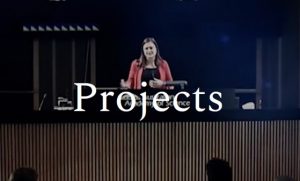 |
ARDC to Announce Successful Projects
ARDC is expected to announce successful projects on Monday, 16-Nov-20.
Watch this space: https://ardc.edu.au/all-projects/?. |
 |
Upcoming Australian ORCID Community Call: 18-Nov
The fourth Australian ORCID Community call is scheduled for Wednesday 18 November 2020 from 11:00 am – 12:00 pm AEST.
This community call will cover:
To receive the zoom community call details, register here: https://www.eventbrite.com.au/e/australian-orcid-community-call-4-tickets-125262061197. |
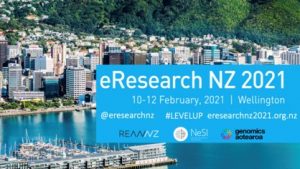 |
eResearch NZ 2021: First Keynote Announced and Submission Deadline 22-Nov
Dr Sydney Shep has been announced as a keynote for eResearch NZ 2021, New Zealand’s annual gathering of researchers and communities using digital research tools and eResearch approaches. Sydney’s current research is grounded in the theories, methods, and practices of digital humanities, spatial history, and cultural informatics.
Want to be part of the programme too? Submissions are invited for in-person and virtual/remote presentations, birds-of-a-feather, and posters related to our theme: Level UP. How are you tackling the increasing speed, agility, scale, and collaboration required in research today? Deadline to submit is 22-Nov.
More information: https://mailchi.mp/nesi/eresearchnz21-registration-submissions-open-2503346. |
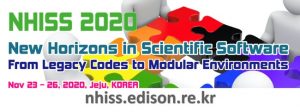 |
Webinar NHISS 2020: New Horizons in Scientific Software: from 23-Nov
As the old-fashioned approach to developing and maintaining computational programs becomes obsolete, an emerging concept of software modularity offers an elegant and timely solution of the looming problems by providing an open development ecosystem where new computational approaches can be rapidly created.
In this conference, hear from researchers who are actively developing the most popular quantum mechanical softwares, such as GAMESS, Psi4, pySCF, Molcas, Columbus, Newton-X, DCDFTBMD, Gellan, Libint, etc.
Free registrations for the first 500 here: https://us02web.zoom.us/webinar/register/WN_B9-QFW89S-OZr0e-EzpfQw?timezone_id=UTC. |
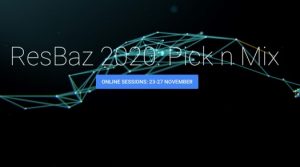 |
New Zealand ResBaz 2020 Events Move Online: from 23-Nov
Join researchers and postgrads from around New Zealand for ResBaz 2020 online and a chance to up-skill in next generation digital research tools and skills. Co-hosted by the University of Auckland and Victoria University of Wellington from 23-27 November, the virtual event’s ‘Pick n Mix’ sessions will offer brief practical introductions to a broad selection of topics and tools related to digital research practice – research data management, research compute, digital humanities, Tidy Data and Open Refine, qualitative analysis with NVivo, R for social sciences, etc. Researchers and postgrads from all disciplines are invited to register!
More information: https://resbaz.auckland.ac.nz/. |
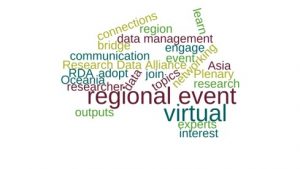 |
RDA Virtual Regional Event: from 23-Nov
Following the recent Research Data Alliance Virtual Plenary 16 (9-12 Nov, https://www.rd-alliance.org/plenaries/rda-16th-plenary-meeting-costa-rica-virtual), join us for a Virtual Regional Event (23-27 November 2020), which will feature sessions on COVID-19, Data Versioning and Data Life Cycle, FAIR, Skills, and Research Software, following and building on some of the discussions and outcomes of the Virtual Plenary.
Visit https://www.rd-alliance.org/group/rda-australia/wiki/rda-vp16-regional-event to find out more and to register for the sessions. |
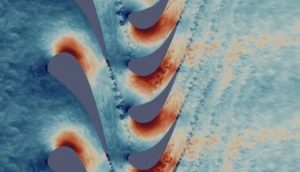 |
Computational Fluid Dynamics and Australia’s Next Generation Supercomputers: 26-Nov
The Pawsey Supercomputing Centre is launching its new bi-monthly “Supercomputing Series”. In this series you will hear from expert researchers, as they discuss possibilities of the new capabilities at the Pawsey Supercomputing Centre.
On 26 November, 10am AWST / 12pm AEST, please join us for our first webinar of the series and hear from Professor Richard Sandberg, at the University of Melbourne whose interest is in high-fidelity simulation of turbulent flows and the associated noise generation in industrially relevant applications, mostly related to power generation and transport.
To register for the event, visit this page: https://pawsey.org.au/event/computational-fluid-dynamics-and-australias-next-generation-of-supercomputers/. |
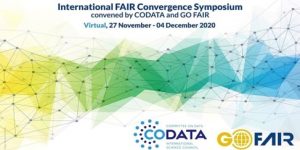 |
FAIR Convergence Symposium, from 27-Nov
The International FAIR Convergence Symposium, 27 Nov-4 Dec, provides a forum for advancing international and cross-domain convergence around FAIR. Register for the conference and join some of the ARDC led sessions such as Teaching FAIR Data Skills – experiences, lessons, next steps and FAIR vocabularies and vocabulary services.
For more information and to register, visit: https://www.eventbrite.com/e/international-fair-convergence-symposium-registration-105931185026. |
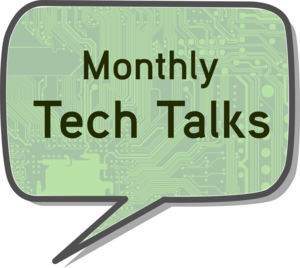 |
Tech Talk: Building Serverless Web Applications for Researchers: 3-Dec
This talk will discuss the advantages, limitations and architecture of building serverless web applications in the research domain. It will explore 2 existing research web applications – Data Mosaic, and Geophysical Processing Toolkit, how they take advantage of serverless technologies and the reasoning behind the architecture.
The talk will be given by Sam Bradley, CSIRO, a full-stack developer working in the CSIRO Mineral Resources Business Unit for the last 2 years, with 12 years of experience delivering all types of software projects from production web applications to experimental scientific prototypes.
For more information and to register/subscribe, visit: https://ardc.edu.au/calendar/ardc-event-list/. |
 |
Free Bioinformatics Workshops, from 4-Dec
Join Australian BioCommons and AARNet in November and December for a series of short online workshops for bioscience researchers on data movement, storage, sharing and analysis.
For more information and to register, visit: https://www.biocommons.org.au/events. |
 |
Google Cloud Research Credits Open till December
Google Cloud research credits, worth up to $5,000USD, are available to provide access to cloud computing and data analytics resources for research projects, open to academic staff and PhD candidates from Australian and New Zealand universities. Individuals can apply directly, as the short application process does not require institutional approval. In general, decisions on applications are reviewed and made within 4-6 weeks.
The 2020 program is open until December, and it is important to note that receiving a grant this year does not prevent you applying for a further grant in 2021 for a different project.
|
 |
UQ and IBM Launch Centre of Excellence
The University of Queensland has partnered with IBM Australia to launch a Centre of Excellence which will support researchers working across health, manufacturing and environmental sciences.
The IBM@UQ Centre of Excellence and Innovation will help address the challenges associated with extreme data growth, data organisation and data storage.
The partnership is expected to accelerate research being conducted at UQ and provide valuable support to researchers.
See: https://rcc.uq.edu.au/article/2020/09/uq-and-ibm-launch-centre-excellence. |
 |
NCI Appoints New Advisory Board Chair
NCI Australia is pleased to announce that Dr Greg Ayers, FTSE, has been appointed Chair of the NCI Advisory Board. Dr Ayers will start in the position in December 2020, following the stewardship of Professor Michael Barber who has served as Chair for the past five years.
A respected leader in the field of atmospheric science, Dr Ayers is the former Director of Meteorology and CEO of Australia’s Bureau of Meteorology following his role as CSIRO’s Chief of Marine and Atmospheric Research.
Further details at: http://www.nci.org.au/news-events/news/nci-welcomes-dr-greg-ayers-advisory-board-chair. |
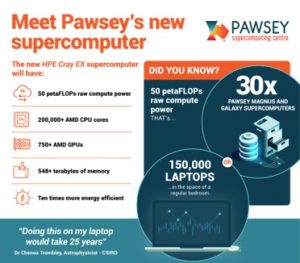 |
Powering the Next Generation of Australian Research
The Pawsey Supercomputing Centre has selected Hewlett Packard Enterprise (HPE) to deliver its new supercomputer, which will power future high-impact Australian research projects by delivering 30 times more compute power than predecessor systems Magnus and Galaxy.
For more information, visit: https://pawsey.org.au/powering-the-next-generation-of-australian-research-with-hpe/. |
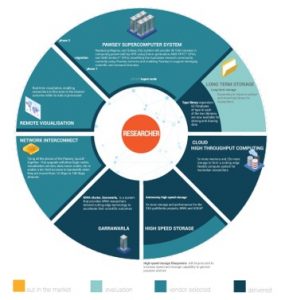 |
Pawsey Capital Refresh Update
October was a very exciting month at Pawsey as it has announced that Hewlett Packard Enterprise (HPE) has been selected to deliver its new supercomputer as part of the biggest upgrade to the Pawsey computing infrastructure. The new supercomputer will deliver up to 50 petaFLOPs, or 30 times more compute power than its predecessor systems.
The ASKAP ingest nodes procurement was awarded to HPE in July 2020. These are one of the most critical components of the pipeline between the ASKAP telescopes and the data store which houses the final data products.
To keep up to date on the Capital Refresh Project visit: https://pawsey.org.au/about-us/capital-refresh/. |
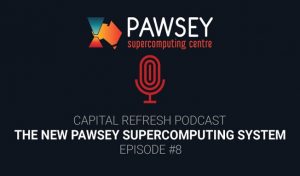 |
Pawsey Capital Refresh Podcast #8: Announcing the PSS with HPE
Join a group of Pawsey’s experts, who were at the forefront of the Pawsey Supercomputing System as they discuss the new HPE infrastructure, and the incredible resources and programs Australian researchers will soon have access to.
This episode is now available on the following platforms (Listen now!): YouTube: https://youtu.be/LoNPVVNbaW8. Apple Podcasts: https://podcasts.apple.com/au/podcast/pawsey-capital-refresh/id1509376229. Spotify: https://open.spotify.com/show/0ddWfQbF0tCW3gzTXAoglG. Google Podcasts: https://podcastsmanager.google.com/show?show=show%3Azi7Cw797fMdWEKf3pA5GIQ&hl=en |
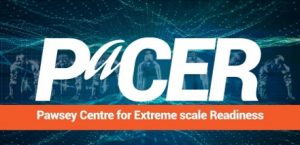 |
Call for PaCER Grand Challenge Problem – Now Open
Pawsey launches new partnering program to achieve HPC research at scale. The Pawsey Supercomputing Centre on 26-Oct-20 opened a call for submissions for a new program that will provide training and support for Australia’s research community, to prepare researchers for the next era of supercomputing and help them to deliver outcomes that benefit the nation.
For more information, visit: https://pawsey.org.au/pawsey-launches-new-partnering-program-to-achieve-hpc-research-at-scale/. |
 |
Why Researchers Love CloudStor
More than 100,000 people in the research and education community have used AARNet’s CloudStor service since it launched in 2014. Over the years CloudStor has evolved from a large file transfer solution to the high performing and easy-to-use collaboration workspace it is today.
Co-developed with the community, CloudStor now offers a growing range of integrated tools for sharing and analysing data. Watch this video to find out why neuroscientist and Macquarie University Research Fellow Robert Luke loves CloudStor: https://youtu.be/GIOKUxbDdvY. |
 |
Propelling the Environmental Efficiency of Jet Engines
Global fuel consumption is continuing to climb, with commercial airlines alone reaching an all-time high of 363 billion litres in 2019. Increasing the efficiency of an aircraft by even 0.1 per cent would have a massive global impact on fuel demand, costs, and the environment.
Professor Richard Sandberg, Chair of Computational Mechanics, and a team at the University of Melbourne are working towards this impact, using high-fidelity simulation approaches to examine the effects turbulence has on aircraft engine efficiency, ultimately creating cleaner methods of air travel.
For more information, visit: https://pawsey.org.au/case_studies/propelling-the-environmental-efficiency-of-jet-engines/. |
 |
State of the Craft in Research Data Management
Data volumes are exploding, and the need to efficiently store and share data quickly, reliably and securely — along with making the data discoverable — is increasingly important. Globus reached out to several research computing leaders at institutions around the world, including New Zealand eScience Infrastructure (NeSI) Director Nick Jones, to gain insights into their research data management approach. A summary of excerpts from those interviews was recently published in ScienceNode.
More information: https://sciencenode.org/feature/Globus%20state%20of%20the%20craft.php. |
 |
Pawsey Director Wins WiTWA Award
Congratulations to Pawsey’s Director of Engagement and Strategic Projects, Jenni Harrison, and all of the incredible women she’s standing next to for this year’s Women in Technology WA Inc. (WiTWA) Tech [+] 20 Award.
WiTWA is a Perth-based, not for profit organisation providing a framework for women in tech [+] to extend their networks and expand their knowledge. Congratulations to Jenni, and all the inspiring women out there now and in the future.
|
 |
AARNet to Pilot New Sensitive Data Service
AARNet has recently been collaborating with members of the research community to develop a proof of concept for a Sensitive Data service designed to meet their unique needs. The project arose in response to the demand from AARNet customers for a secure and sustainable long-term cloud environment located in Australia where sensitive research data can be collected, stored and analysed.
The proof of concept was shared with the eResearch community at the eRA20 conference in October and moves into pilot phase in early 2021 with an initial three institutions on board.
More information or to express interest in participating, contact Frankie.Stevens@aarnet.edu.au. |
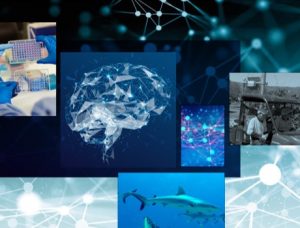 |
ARDC Case Studies
A collection of six ARDC case studies highlights the various ways the ARDC has supported Australian researchers and their research; and in turn, how this has translated into environmental, economic and social benefits for Australian and international governments, a range of industries and the broader community.
|
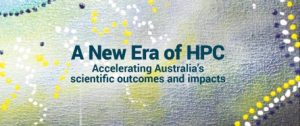 |
Pawsey Annual Report
The 2019 – 2020 Pawsey Annual Report has now been released. Focusing on “A New Era of HPC, Accelerating Australia’s Scientific Outcomes and Impacts”, this report showcases the amazing outcomes and voices of science at the Pawsey Supercomputing Centre. It highlights the next generation of Supercomputing in Australia which will enable a new era of research for the Nation.
To read the full annual report, visit this page: https://pawsey.org.au/about-us/documents-library-annual-reports/2019-2020-annual-report/ |
 |
NeCTAR Research Cloud Given Huge Boost
Australia’s national research cloud service, the Nectar Research Cloud, which provides Australian researchers with an agile and consistent cloud computing experience, has achieved a significant milestone with the commissioning of the refreshed infrastructure at the University of Melbourne node, with 6000 virtual cores and 1.9 PB of storage for nationally significant research.
The University of Melbourne, Monash University, Tasmanian Partnership for Advanced Computing (TPAC), Intersect and Queensland Cyber Infrastructure Foundation (QCIF) were successful bidders in the refresh and are scheduled to be online and providing access to their new infrastructure by late 2020/early 2021.
Fopr more information, see: https://ardc.edu.au/news/research-capacity-given-huge-boost-with-nectar-research-cloud-refresh-at-the-university-of-melbourne/. |
 |
Intersect Appoints New CEO
Satish Nair has been appointed to the role of CEO. Satish has been working with Intersect as Interim CEO since December 2019 and in this short time has steered the business through a number of strategic and operational changes. His success in the role to date and previous experience as Intersect CFO from 2012 – 2018, makes him an excellent candidate for the CEO role and Intersect is pleased to confirm his longer term appointment.
The positions of Head of Technology and Head of Membership Services have also been created, filled respectively by Craig Hamilton and Jonathan Arthur.
See: https://intersect.org.au/new-ceo-and-staff-appointments-at-intersect/ |
 |
Persistent Identifiers: PIDapalooza Festival: 27-Jan-21
Submissions are now open for PIDapalooza, the open “festival” of persistent identifiers. Also known as PIDs, persistent identifiers such as ORCID and DOI are a core component of world class research infrastructure. As specified in the FAIR Data Principles, PIDs provide global methods to uniquely identify and connect entities in the research system such as researchers, funders, organisations, articles, datasets, software, and samples.
PIDapalooza 2021 will be a 24-hour nonstop PID party happening virtually and around the world in January.
More information at https://www.pidapalooza.org/ or email Natasha.Simons@ardc.edu.au (APAC PIDapalooza Party Planning Committee). |
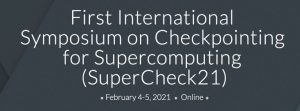 |
Checkpointing for Supercomputing: 4-Feb-21
NERSC is hosting the First International Symposium on Checkpointing for Supercomputing (SuperCheck21), which will be held February 4-5, 2021. This free event will be held online and will feature the latest work in checkpoint/restart research, tools development, and production use.
Checkpoint/Restart (C/R) is critical for fault-tolerant computing in high-performance computing (HPC). While there has been much research and development on C/R and C/R tools, few HPC end users are able to use them in production workloads. Although research codes often demonstrate promising C/R capabilities, there are no feasible C/R options for diverse production workloads, especially on cutting-edge HPC systems.
To register, click here: https://ckpt-symposium.lbl.gov/home |
 |
eResearch Jobs
AeRO provides details of the latest eResearch job opportunities in the sector. Jobs are posted immediately to https://twitter.com/AeRO_eResearch, and the website at http://aero.edu.au/jobs/ is also updated. This is a free service for the whole eResearch community – to advertise a position, simply email loretta@aero.edu.au. Here are some current vacancies: Service Engagement Manager, Development Programmer, Solution Analyst, Senior Project Manager, REANNZ Finance and Office Administrator. |
Contributions
This newsletter is based on contributions provided by members of the eResearch community, and draws on news articles and newsletters published across the sector. The Newsletter is published around the 16th of each month.
Please send any contributions (max. 100 words, plus a link and image) or pointers to any other relevant articles or newsletters to editor@aero.edu.au
Archives of these Newsletters are held at http://aero.edu.au/newsletters/.
Click HERE to add yourself to the eResearch Mailing List.
Thanks,
—AeRO Newsletter Editor

